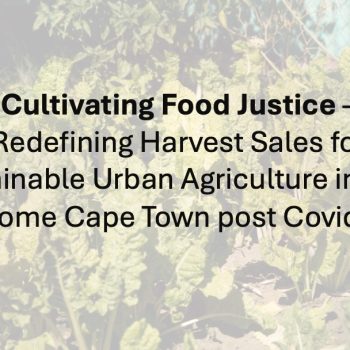By 2020, the urban population of the South is expected to exceed 50% for the first time in history. Over the next 30 years, virtually all of the anticipated 3 billion increase in the human population will occur in cities of the South. By 2030 these cities will absorb 95% of global urban growth, becoming home to 80% of the world’s urban population. Accompanying this urban transition is a growing crisis of food insecurity in cities and city-regions. Even in countries experiencing economic growth, food insecurity is a major challenge.
The Hungry Cities Partnership (HCP) was created in 2015 to address the links between three of the UN Sustainable Development Goals:
- Goal 1: No Poverty
- Goal 2: Zero Hunger and
- Goal 11: Sustainable Cities and Communities
The HCP brings together partners from across the Global South to collaboratively address the food security challenge of rapid urbanisation in Africa, Asia and the Caribbean. The Partnership currently operates in China, India, Kenya, Jamaica, Mozambique, Nairobi and South Africa and is actively developing new partnerships in other countries and cities.
The main objectives of the HCP are to:
- Examine the levels and determinants of all four dimensions of food security — availability, access, utilisation and stability — in a range of cities across the Global South and the relationships between food insecurity, poverty and urban food systems;
- Generate a significant body of comparative, inter-disciplinary knowledge on the organisation, structure and potential for inclusive growth in the informal food economy and implications for food security in cities of the Global South;
- Analyse the implications of supermarket competition for entrepreneurship, innovation, job creation and inclusive growth in the urban informal food economy;
- Critically assess opportunities for women and youth to be incorporated into urban food systems as entrepreneurs and employees with decent jobs;
- Assess national, regional and municipal policies that enable or constrain enterprise development, entrepreneurship and innovation in the informal food economy;
- Build the institutional capacity of research organisations and networks in the South to conduct collaborative, policy-oriented research on urban food systems; and
- Mentor and train graduate students and post-doctoral researchers to conduct rigorous, high-impact research on urban food security and inclusive growth.
The HCP aims to build a policy-oriented knowledge platform to positively impact on the regulatory environment governing urban food systems in partner cities as well as influence the emerging global development agendas on urbanisation, food security and poverty alleviation.
The current partner cities in the HCP are:
- Bangalore in India
- Cape Town in South Africa
- Kingston in Jamaica
- Maputo in Mozambique
- Mexico City in Mexico
- Nairobi in Kenya
- Nanjing in China
Prof Edgar Pieterse, co-PI of the Hungry Cities Project, introduced the research project here in December 2014. Click here for video.
Programme details
International Partnerships for Sustainable Societies (IPaSS)
International Development Research Centre (IDRC)
Social Sciences and Humanities Research Council of Canada (SSHRC).

